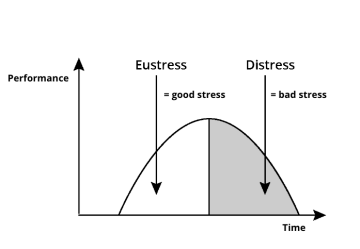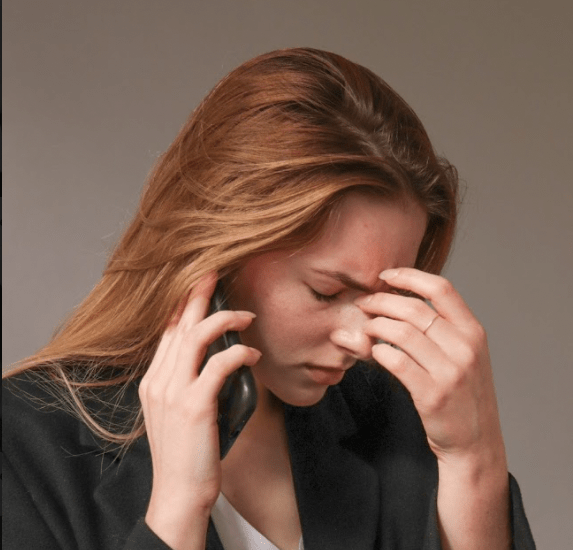Stress
Stress is a common body reaction to potential danger. When the brain senses a heavy load, it switches on a defense mechanism to cope better. When the brain doesn’t feel overloaded, your system should go back to rest. If it doesn’t – and it’s common these days – health issues arise.
What are the symptoms?
Physical:
- Headache
- Muscle pain
- Chest pain
- Fatigue
- Low sex drive
- Sleep disorders
Psychological:
- Anxiety
- Sadness or feeling overloaded
- Anger
- Overeating or starving
There are two types of stress:
1. Eustress
Eustress – the good one – increases the system’s activity and performance and helps with focusing.
2. Distress
Distress – obviously, the bad one – which loads the system and might damage it.


What are the effects of long-term stress?
If you’ve been stressed for a long time, it can lead to many complications and diseases such as:
- High blood pressure
- Heart diseases
- Obesity
- Diabetes
- Depression
- Burnout
How to prevent it?
- Think positive – even though it seems like a hard task. Positive thinking helps us to rest and control the stress. Instead of “I can’t do it!”, say “I’m gonna try my best!”.
- Try to stop for a minute during the day to clear your mind (a walk or breathing exercise helps).
- Focus on activites that boost your mood. Play your favourite film, read a book before sleep, have dinner with your friends or get back to your old hobbies.
- Don’t forget that you can relax not only by watching your favourite series. You can try a sport, yoga or breathing exercises. You can take a walk from work as well.
- Set realistic goals. Make a daily to-do list and try to get the tasks done.
- Live a healthy lifetyle. Avoid alcohol, cigarettes and drugs as they make the situation worse.

FAQ
What to do when…
If there’s someone close to you suffering from a mental illness, do not judge the or tell them to “try harder”. Give them the much needed support and understanding. They’re far from alone in this.
Who to ask?
- Close people who you trust
- General practitioner, therapist, psychologist
- Support groups, patient organisations
- Crisis centres, helplines
What are the steps to take?
- Are you in a situation that must be sorted out immediately and can’t deal with it alone? Reach out to a crisis centre.
- Are you in a situation where it’s unnecessary to sort it out immediately?
- “I CAN cover the expense.” See a therapist. They can send you to see a psychiatrist.
- “I CAN’T cover the expense.” See your GP, who’ll send you to a therapist who’s covered by the insurance company.
- “I don’t know who to choose.” Your GP will recommend you one.
When and who to ask for help?
How does a healthy lifestyle prevent stress?
Good-quality sleep – Ideally, everyone should sleep somewhere between 7–9 hours a night. It all depends on your age of course. Setting a time you’ll regularly go to sleep and wake up will help a lot.
Balanced and healthy diet – is a building block of mental health. It supplies us with energy and creates our body constitution.
Regular exercise – It’s indispensable to overall health. Regular exercise supports our physical and mental health. It relieves stress and anxiety and boosts self-confidence. That’s why it’s an essential factor of mental health prevention. At the same time, it improves the life’s quality of people already suffering from mental illness (mostly depression treatment). Try to find an activity you’ll like and practice it 3 times a week for at least 30 minutes.
Time management – We all have a huge amount of responsibilities, that’s why it’s important to master time management. Add enough relaxing time to your daily schedule (active or passive), and set working and “you” time.
Relaxing and autoregulation exercises – These are essential for mental hygiene, they help with purposeful stress management and support inner balance. Relaxing rids us of muscle and mental tension and regenerates and recovers our bodies (including the brain). Try yoga, walking, exercising or meditation.
Support online education about prevention
We want people to like prevention and make it a standard part of their lives. That’s why we create infographics, videos, articles or podcasts, which we post on Instagram, YouTube or our website. Help us educate online.
Support online education about prevention
We want people to like prevention and make it a standard part of their lives. That’s why we create infographics, videos, articles or podcasts, which we post on Instagram, YouTube or our website. Help us educate online.

